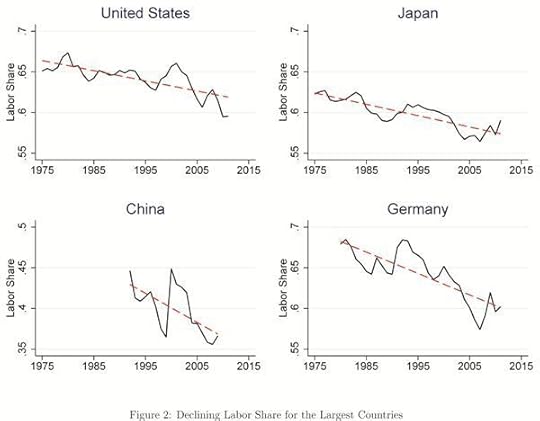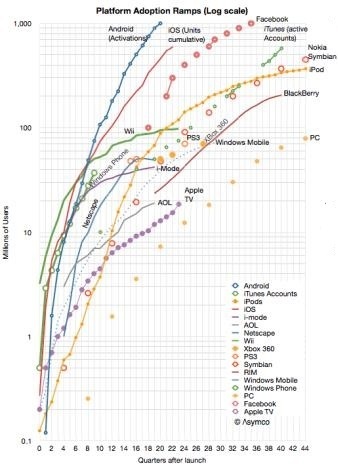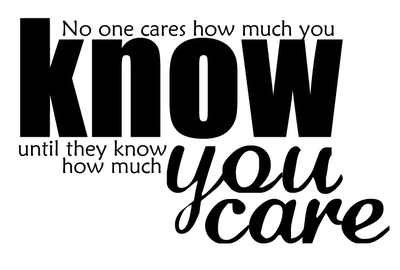Jeremie Averous's Blog, page 128
November 9, 2013
The Job of a Leader is to Grow More Leaders
It is the first point of Robin Sharma’s ‘the top 10 things amazing leader do‘ post.

As a leader, do you recognize the mighty oaks in the acorns around you?
Actually this is so true that I deem leaders who fail to groom successors and can’t pass on their steering wheel utter failures at leaders. Even if their organization had been successful under their helm.
What serves to deliver great results if they can’t be sustained after you are gone? When you have an unfortunate accident? It is just so true that one of the prime roles of leaders is to develop more leaders. And it is something you can see and touch readily in organizations. It is never a secret to know if the leader is coaching and mentoring others to grow and become successful as leaders. This practice, when it exists, pervades an entire organization.
It remains even more so in the Fourth Revolution, within the smaller core of organizations. At its core, movement leadership only does its job if it grooms future leaders. If the leader knows to step aside to leave younger generations take over in time.
Be a leader. Grow leaders!
November 7, 2013
How the Fourth Revolution Visibly Changes Economic Value Creation
The share of labor and wages is declining in most countries – often to the benefit of corporate profit.

The decrease in the share of labor in the economy in some countries
In this interesting (but long) scholarly article “The Global Decline of the Labor Share�”, University of Chicago researchers show that it is a general trend due to the relative decrease of value required for capital.
In other words “the decrease in the relative price of investment goods,often attributed to advances in information technology and the computer age, induced fi�rms to shift away from labor and toward capital“.
The capital required for value creation is relatively less expensive now than it was a few decades ago (everybody can create a company with a single laptop).
This is a society issue that needs to be tackled – because this is a deep Fourth Revolution trend that won’t reverse!
November 5, 2013
How to create disruption for billions in 18 months
Disruption happens ever more quickly. According to this excellent post on Asymco, Android is the third platform to reach 1 billion users.
 Only that according to the graph, Android took 1.5 years to get there; Facebook took 3 years and Windows (two decades ago) probably something like 5 years.
Only that according to the graph, Android took 1.5 years to get there; Facebook took 3 years and Windows (two decades ago) probably something like 5 years.
1 billion user is planet-wide disruption. And today it only takes a few month for successful ecosystems to disrupt the planet and change our habits.
Do you remember the first version of the iPhone went on sale mid-2007? 6 years ago ONLY?
Food for thought.

November 2, 2013
Why You Should not Seek to Adapt too much to your Circumstances
“The Better Adapted You Are, the Less Adaptable You Tend to Be“. Systems and living beings tend to adapt as much as possible to their environment. With a dramatic effect: if they become too adapted, too specialized, they become vulnerable.

It can be dangerous to be too specialized!
Human success in nature is mainly due to our adaptability across different climates, seasons and living conditions.
Yet we tend to forget too often that adaptability has been our key for success for generations, like for example when the Industrial Age taught us that specialization was best for our social success (see the post ‘Stop to be Excessively Specialized – Become a Generalist to be Successful in the Collaborative Age‘).
Gerald Weinberg, whom this quote is from (in ‘The Secrets of Consulting‘), continues: “This law provides one reason why people need consultants. Consultants are less adapted to the present situation, and therefore are potentially more adaptable. Their perception of now/then tradeoffs is different from those close to the problem, which makes them a valuable source of ideas (as well as people not to be trusted)“. That’s why you need to have candids in your meetings and make sure you always bring people that have not been too associated with your ideas.
Remain adaptable. Seek outside advice. And you’ll be successful.

October 31, 2013
How to Overcome the Experts’ Confidence Conundrum?
“If someone’s confidence is high, we believe they are probably right; if they are less certain, we feel they are less reliable“, research suggests, as reported by Dan Gardner in ‘Future Babble: Why Expert Predictions Fail – and Why We Believe Them Anyway‘.
 “Obviously, this means we deem those who are dead certain the best forecasters, while those who make ‘probabilistic calls’ – like “it is probable this will happen but not certain” – must be less accurate, and anyone who dares to say the odds of something are 50-50 will be met with scorn“. The author goes on to add that it is not a conscious decision path.
“Obviously, this means we deem those who are dead certain the best forecasters, while those who make ‘probabilistic calls’ – like “it is probable this will happen but not certain” – must be less accurate, and anyone who dares to say the odds of something are 50-50 will be met with scorn“. The author goes on to add that it is not a conscious decision path.
So let’s summarize: we tend to believe those confident experts – who are probably wrong. And we tend to discredit those experts that don’t look too confident and who qualify their statements or speak about probabilities – who are probably closer to the truth or what can be said about it at the present moment. That’s quite an annoying situation, isn’t it?
I have personally drawn a personal conclusion: when too many experts agree with high confidence, I conclude that is groupthink and that it is worthwhile to take a contrarian position. At least you establish a noticeable difference with the bulk of the experts!
Be careful of experts that look too confident – they are probably wrong when it comes to predictions.

October 29, 2013
From Blogger to Beauty Guru to Celebrity Businesswoman in 6 Years
August 2013 headlines: After six years of tutorials and millions of views, YouTube beauty guru Michelle Phan has launched her own 250-product line of makeup – backed by L’Oreal.
 I am not particularly a fan or expert on makeup (!) but I found it to be a great story to show the power of the Fourth Revolution. Michelle is clearly passionate about makeup. After some blogging she started posting videos on Youtube in 2007. Obviously there was a need! She has today 769 million views and has 4.6 million subscribers! And what was a passion became a business. AT 23 years old L’Orelas backed up her video making. And at 26 years old L’Oreal backs her up for a personal line of makeup.
I am not particularly a fan or expert on makeup (!) but I found it to be a great story to show the power of the Fourth Revolution. Michelle is clearly passionate about makeup. After some blogging she started posting videos on Youtube in 2007. Obviously there was a need! She has today 769 million views and has 4.6 million subscribers! And what was a passion became a business. AT 23 years old L’Orelas backed up her video making. And at 26 years old L’Oreal backs her up for a personal line of makeup.
This great post on Mashable explains her story. Her secret recipe is story-telling. “Success is like a lightning bolt. It’ll strike you when you least expect it, and you just have to keep the momentum going” she says! This other post is also quite instructive about her career.
Coming from a humble background, with passion and having obviously fun, Michelle created what will soon be an empire. She created tremendous value for many people (for free). And most of her fans are at the other end of the planet, in Asia. And all thanks to the Fourth Revolution!
Have a look at the promotional Youtube movie for her product line which recounts her journey and where she thanks the community she created around her for giving her all the ideas that founded her success and her product. Still don’t believe in the Fourth Revolution?
More material: Michelle has also her own Wikipedia page, here is the link to her Youtube channel, and her website.

October 26, 2013
How to Seek and Practice Joyfear
Joyfear is a neologism I found in Leo Babuta‘s latest writings ‘my pursuit of the art of living‘.
 “Joy is an awesome thing to have, but joyfear is present in the powerful moments in life where joy and fear mix, where we’re taking chances and doing something outside of our comfort zone that both excites us and makes us face the possibility of failure. I now embrace these moments rather than avoiding them“.
“Joy is an awesome thing to have, but joyfear is present in the powerful moments in life where joy and fear mix, where we’re taking chances and doing something outside of our comfort zone that both excites us and makes us face the possibility of failure. I now embrace these moments rather than avoiding them“.
I like the concept. Stepping out of your comfort zone certainly creates fear, and also creates joy when is happens. I find joyfear an extremely powerful concept that I try to practice more often. A word that is powerful enough to change one’s life.
As Leo says, “Do not shy away from Joyfear. Seek it out. Recognize it when you happen upon it. Joyfear will change your life, and you’ll never forget the moment you find it.”
Thanks Leo.

People Don’t Care How Much You Know, Unless They Know How Much You Care
This classical quote is mentioned the excellent book “the Perfect Pitch – The Art of Selling Ideas and Winning New Business” by Jon Steel about public speaking and presenting.
 Yet it obviously also does apply to many other instances in our daily lives.
Yet it obviously also does apply to many other instances in our daily lives.
It is amazing how turned-off people can turn on if you show a little bit of caring.
What is caring but the expression of an attempt an emotional connection?
Show that you care in negotiations, and in any situation where you interact with people. And be certain that in all cases, nobody cares about how much or what you know!

October 24, 2013
If you Want to Become Unstoppable… Don’t Stop!
I found this beautiful sentence in an excellent post by Manal Ghosain, ‘the Persistence‘.
 Becoming unstoppable is often not an issue of unbearable external forces but much more frequentlyan internal issue.
Becoming unstoppable is often not an issue of unbearable external forces but much more frequentlyan internal issue.
It’s all about personal persistence.
As Manal highlights, it’s often all about letting go of expectations, judgment and comparisons.
Become unstoppable. Just don’t stop!

October 22, 2013
How Regulation is Used to Defend old Institutions
Avid readers of this blog will know how much we believe and observe that the Fourth Revolution will transform existing institutions. Older institutions do fight back though – and often through the usage of existing regulations, which do in fact tend to reinforce the status quo.

Older Institution in need of a facelift?
A good summary of the issues faced by a number of startups that intend to radically change the economics of certain sectors such as taxi (Uber), accommodation (Airbnb) is available in this post ‘New innovators face backlash‘.
Issues related to tax that are faced by the web leaders such as Google and Amazon can be added to the evidence. In fact it is amazing how existing regulations promote stability. And hence do promote deep instability when changes are so significant that the former order of things can’t work any more.
Would the legislative inflation that can be observed in many countries nowadays be another sign of the resistance against the Fourth Revolution?
In any case, really disruptive innovations will necessarily hit existing regulations as they become significant enough to be noticeable. Those countries that will be flexible enough will succeed quicker in the transition to the Collaborative Age. Which are they?




